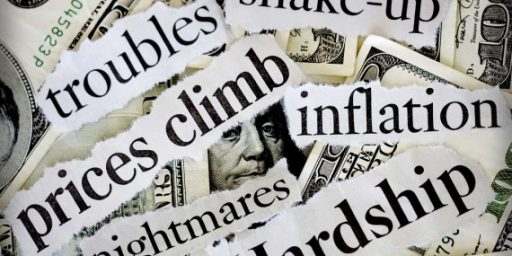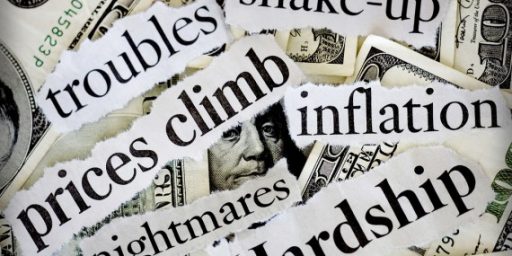Bubbles Great for the Economy
Slate and NYT columnist Daniel Gross has written a book, Pop! Why Bubbles Are Great for the Economy, due out next week. Financial Times has a reportedly reviewed it quite favorably but, alas, said review (“A heresy wise investors might embrace”) is behind a subscriber wall.
Tyler Cowen pronounces it a “stimulating book, worth your time and money.” His précis of the argument:
Bubbles leave behind an economic infrastructure that spurs later growth. The telegraph and railroad bubbles of the 19th century gave birth to modern communications and transportation. The fiber-optic bubble of the 90s paved the way for YouTube and MySpace. Might we need a “green bubble” to solve current energy problems?
[…]
Of course Gross is smart enough not to defend all bubbles. Perhaps bubbles are best when an economy has the potential for breaking through to a new high-growth mode; that would cover today and the mid- to late 19th century. I am less convinced by his treatment of the 1920s bubble, which he cites as beneficial in paving the way for the New Deal. I see a smoother economic path as having brought the better parts of the New Deal without so many of the overreactions.
Gross argues that government should support many bubbles instead of choking them off. At the very least, bubbles are underrated
It would be hard to conceive sparking the New Deal, aka the socialization of the American economy, as a sign of market forces working. Otherwise, the argument (as summarized) strikes me as quite plausible.
The Internet bubble paved the way for a massive Web-based economy and innovation. The cyclical housing bubbles provide capital for tearing down dilapidated housing and otherwise upgrading neighborhoods. The fact that investors who jump in late and are not prudently diversified get hurt doesn’t negate these benefits.
UPDATE: Kevin Drum observes that “market forces working” isn’t the same as “good for the economy” and thinks the New Deal was the latter:
Modern economies have a hard time operating efficiently without a fair amount of regulation, and the New Deal provided exactly that: the SEC to ensure transparency in financial markets, the FDIC to restore trust in the banking system, unemployment insurance and a minimum wage to provide at least a minimal buy-in to capitalism from the working class, and much else. The New Deal may have had its overreaches, but 70 years later I think everyone not to Tom DeLay’s right agrees that moderately regulated capitalism works better than unregulated capitalism, and that framework was what the New Deal provided.
I don’t disagree. It may well be that Gross meant “New Deal” in the sense Drum does (the creation of regulatory checks on banking and stock speculation) rather than in the sense I think of it (various make-work projects like the WPA, CCC, TVA, and the like plus Social Security and other social welfare programs). Indeed, that would make more sense in terms of his thesis.
I’m not sure what Tom DeLay believes in, if anything, so I’m not sure where I’d place myself in relation to him on the economic philosophy spectrum. I’m squarely in the Friedman-Hayek mode, of preferring maximal freedom with the government there to check gross excesses and to provide a safety net for the truly needy.






Perhaps someone could explain to me why that’s not a “broken window” argument.
If all he’s saying is that a bubble leaves behind excess capacity that can be exploited, it’s probably correct. If he’s saying that’s a good thing, it doesn’t appear to me the point is quite so clear.
Slow news week … Tenet “blame anyone but me” memoir, Gonzales “consult anyone but me” memo, 4 years of the reality occupation series “Mission Accomplished” …
Definitely staying outside the beltway!
Definitely staying outside the beltway!
Yeah. The problem is those stories are just boring repeats of the same old crap. The NFL draft has been the most interesting thing lately!
Anderson, slow news day, how about coming and checking out this new world I found with my telescope, http://www.ddo.com., it even has life on it, if your good.
Oh ya. its way way out of the belt way.
Sounds to me like Gross has bubbles on the brain. He needed a whole book to get his point across? I am sure economists everywhere will be buying it (NOT!).
Maybe we need a “liberal” bubble. They win the presidency in ’08 and retain congress, subsequently raising taxes. The economy goes to crap, receipts dwindle, deficits rise even though military spending is drastically cut; people starve, terrorists attack, Americans die burning in jet-fueled fires or jumping out of windows.
Wow, talk about a bubble and creating capacity for change!
The major Sunni block of the Iraqi government did just strongly threaten pulling out altogether. That’s kind of big news given that the Maliki government already appeared to be on last legs with the loss of Sadr.
http://www.washingtonmonthly.com/archives/individual/2007_05/011220.php
Anyway back on topic:
the bubble idea is interesting. I think the counter argument to the “broken window” charge is that in this case money is being diverted from things that aren’t important to build infrastructure that is critical but too costly to normally invest in. Of course not every bubble is going to lay the foundation for later important developments as the author seems to acknowledge.
That’s still a broken window argument.
How’s that? The broken window fallacy says that you ignore that money previously used to do good was diverted to repair a bad. In this case we are talking about money diverted from a bad to do a good. It’s an un-broken window argument, if you like.
Just to be clear I’m not sure I agree with the statement, I’m just throwing it out there as a possibility.
That’s not what the broken window fallacy is. The broken window fallacy is one of ignoring opportunity costs.
As best as I can tell (without having read the book which I suspect I never will) the argument being made about bubbles is a pretty good example of a broken window argument. In a bubble investment dollars are speculatively diverted from other opportunties into whatever the bubble is in. Excess infrastructure is created which, down the road, can be turned to good advantage. But that ignores the benefits that might have been realized if the investment dollars hadn’t been diverted speculatively at all. Broken window fallacy.
Perhaps I’m wrong and it’s more subtle than this.
As Don Ho might have sung had he been channeling Aristotle on this topic, “Tiny bubbles…”
well…
http://en.wikipedia.org/wiki/Parable_of_the_broken_window
From the same source that you cite:
Emphasis mine.
Okay, now explain how the term “opportunity cost” is different from what I described, because the part I quoted matches what I described (although in much better terms).
Gross needs to take a look at these homes in Southern California:
Real Homes of Genius – Inglewood for $329,000 and 500+ Square Feet
Yes, bubbles are fantastic for the economy. I’m sure the Dutch are marveling at the medical cures ushered in by the tulip bulb mania centuries ago. Or maybe the bubble in beanie babies made us more sensitive to plush toys.
The bubble in housing is outrageous and to say bubbles are good for the economy is like saying debt equals wealth. But we do live in a double-speak environment where in the last 7 years 30% of job growth was contributed by real estate. How trading houses like baseball cards is good for the economy is beyond me. Maybe I’ll buy this book coupled with Mr. Lereah’s book. I’m sure the rhetoric will be fair and balanced.